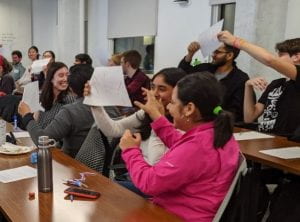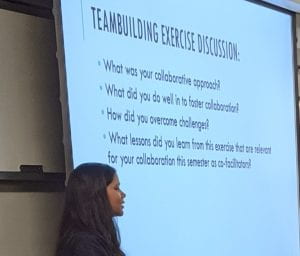Learning isn’t as simple as being ‘provided’ information and then immediately understanding it in all its depth and complexity, at least not for most people. There are tools and practices that can be used to facilitate various levels of understanding. Using these tools effectively requires an awareness that learning most often occurs in a social context. In the College of Engineering, the Engineering Learning Initiatives (ELI) team works with several groups of graduate and undergraduate students who are striving to improve learning experiences in many courses each semester.
Academic Excellence Workshop (AEW) facilitators are one such group. AEW facilitators receive training and work in teams of two to run weekly sessions for their undergraduate peers. Students enrolled in participating undergraduate courses have the option to enroll in one of the related AEW workshop sections. Facilitators use student-centered teaching and learning strategies to help students engage with course materials and their classmates in a variety of interactive ways to solidify and deepen their understanding.
About halfway through the first AEW training of the spring semester, pairs of undergraduate workshop facilitators are seated next to their new co-facilitators. Before they run their first session they need to learn something about the way in which each of them communicates, and figure out how to negotiate their collaboration. They need to start to develop the social context in which their work together and their work with enrolled students will happen.
 After having done a group ‘ice breaker’ and having been introduced to the goals and objectives of the workshop, the teams sit side-by-side with four pieces of yarn attached to a marker and try to cooperatively write the letters ‘A’ ‘E’ and ‘W’ without actually touching the marker. In order to do this, they have to work in concert. They must verbally and non-verbally communicate to create the forces on the markers via the 4 pieces of yarn; thus learning a little bit about how they might work together. Following this good-natured competition over which team could produce the most legible letters, one of the experienced AEW facilitators debriefs the activity with leading questions about what each of the groups did to successfully complete the task. They also discuss how they would apply this to their future teamwork.
After having done a group ‘ice breaker’ and having been introduced to the goals and objectives of the workshop, the teams sit side-by-side with four pieces of yarn attached to a marker and try to cooperatively write the letters ‘A’ ‘E’ and ‘W’ without actually touching the marker. In order to do this, they have to work in concert. They must verbally and non-verbally communicate to create the forces on the markers via the 4 pieces of yarn; thus learning a little bit about how they might work together. Following this good-natured competition over which team could produce the most legible letters, one of the experienced AEW facilitators debriefs the activity with leading questions about what each of the groups did to successfully complete the task. They also discuss how they would apply this to their future teamwork.
Good workshop facilitation means adding social skills to disciplinary expertise. Moving forward into the semester, these dedicated students will continue to train and hone their skills of communication and group facilitation.
This Edu-blog is brought to you by the ELI TEAM in Rhodes Hall. If you are interested in working with us contact eng-learning@cornell.edu
